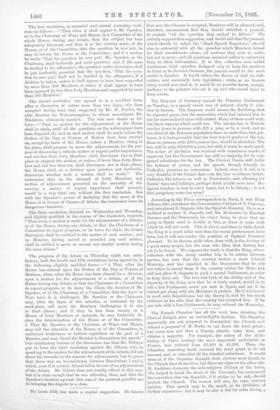The progress of the debate on Thursday night was satis-
factory, both the fourth and fifth resolutions being agreed to, in the following slightly modified forms :—" 4. That, after the House has entered upon the Orders of the Day or Notices of Motions, when, after the House has been cleared for a division, upon a motion for the adjournment of a debate, or of the House during any debate, or that the Chairman of a Committee do report progress, or do leave the Chair, the decision of Mr. Speaker, or of the Chairman of a Committee, that the Ayes or Noes have it, is challenged, Mr. Speaker or the Chairman may, after the lapse of two minutes, as indicated by the sand-glass, call upon the Members challenging it to rise in their places ; and if they be less than twenty in a House of forty Members or upwards, he may forthwith de- clare the determination of the House or of the Committee. 5. That Mr. Speaker, or the Chairman of Ways and Means, may call the attention of the House, or of the Committee, to continued irrelevance or tedious repetition on the part of a Member, and may direct the Member to discontinue his speech." One satisfactory feature of the discussion was that Mr. Dillwyn put in force the third resolution against Mr. Gibson, who, in speaking to the motion for the adjournment of the debate, did not direct his remarks to the reasons for adjournment, but to prove that there was an inconsistency between Resolutions 1 and 4, which, even if it existed, did not tell in favour of an adjournment of the debate. Mr. Gibson does not usually offend in this way, but it is clear enough that he was offending then, and that the Speaker's decision against him was of the greatest possible use in bringing the dispute to a close.


































 Previous page
Previous page